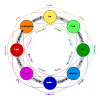Irritability
Irritability is the excitatory ability that living organism have to respond to changes in their environment. The term is used for both the physiological reaction to stimuli and for the pathological, abnormal or excessive sensitivity to stimuli. Neurobiologically, irritability can be adaptive and productive, motivating the living organism to overcome barriers, and it can be non-productive, resulting in maladaptive behavior, when prolonged or disproportionate. The underlying brain circuits are thought to be those that are involved with reward processing.
| Irritability | |
|---|---|
| Specialty | Psychiatry |
In humans, irritability can be viewed as the consequence of a low threshold for experiencing frustration or "frustrative nonreward", when one is failing to receive an expected reward. There is no standard definition and there are no standard measurements in psychiatry, which would be spanning childhood through adulthood.
Definition
Irritability is the excitatory ability that living organisms have to respond to changes in their environment.[1] The term is used for both the physiological reaction to stimuli and for the pathological, abnormal or excessive sensitivity to stimuli. Irritability can be demonstrated in behavioral responses to both physiological and behavioral stimuli, including environmental, situational, sociological, and emotional stimuli.For example, irritability can be a response to the objective stimulus of hunger or thirst in animals or humans, which then reaches some level of awareness of that need.
In humans, irritability is a prototypical transdiagnostic symptom in psychology and psychiatry without a standard definition and without standard measurements which would span childhood through adulthood.[2] In a 2017 study of the psychiatric literature, 21 definitions and 11 measures of irritability were found, all of which overlapped with anger andaggression.[3]
Signs and symptoms
In humans irritability is the state of feeling aggravated, frustrated, or being prone to anger.[4] It is commonly found when in stressful or pressured situations. These states can coincide with social lives and daily routines, making it more difficult to maintain. Someone is considered for to be irritable when they have a short temper and easily become frustrated in their situation and do not know how to stay calm in a pressured situation. Irritability is considered an emotion and can affect the mood in a negative way.
Irritability is commonly developed from anxiety disorders.[5] The fight or flight responses triggered in the brain can make irritability easily developed and result in severe grouchiness and aggravation towards other people. Stress hormones take over and lead to attitudes of negative reactions.[6] Feelings of fatigue and difficulty of concentrating plays a part of this type of mood.[7]
Symptoms and signs of irritability may include sweating, hot flashes, increased heart rate, confusion, excessive breathing, excessive guilt, headaches, suicidal thoughts.
Neurophysiology
As of 2019, neuroscience explains irritability with the brain circuits underlying reward processing. It has been known that mismatch between expected and actual reward (also called "negative prediction error"), can lead to a state of frustration.[2]
This "frustrative nonreward" was first described by Abram Amsel in the 1950s and demonstrated in animal experiments by Nathan Azrin in 1966.[2] It is thought to be an evolutionarily conserved behavior linking prediction error and aggression.[2]
Negative prediction errors cause decreases in dopamine neuron firing. On the one hand this reduces the valuation of a stimulus, and thus helps learning, on the other hand it could increase the likelihood of aggression. Neurobiologically irritability can be adaptive and productive, motivating the living organism to overcome barriers or to dominate the environment. It can be non-productive, resulting in maladaptive behavior when prolonged or disproportionate.[2]
There appear to be different brain mechanisms associated irritability in children: First, irritability diminishes from toddlerhood through school age with increasing maturity of prefrontal cortex. Also, brain signatures of children with disruptive mood dysregulation disorder (DMDD), anxiety disorders, and attention deficit hyperactivity disorder are similar, while they differ from those with childhood bipolar disorder.[2]
Causes
Causes may range from physiological causes like sleep deprivation, hormone imbalance maladaptation to stress and poor lifestyle. Irritability is a symptom in mental disorders throughout the life span, including depression, posttraumatic stress disorder, dementia, premenstrual dysphoric disorder, traumatic brain injury and borderline personality disorder.[2]
Treatments
The only US Food and Drug Administration–approved medications for irritability are risperidone and aripiprazole in the context of autism. Stimulants and serotonin reuptake inhibitors are used, as well as cognitive behavioral therapy and parent management training.[2]
A change of lifestyle habits can assist in relieving the condition of irritability. Recommendations include reducing dietary intake of sodium and sugar. Managing sleep is crucial.[8]
Prevention
Offering help to others and being more sympathetic can change emotions to positive feelings. Reducing caffeine intake to allow body can fully rest during the night and so no addiction is developed.[9] Substituting caffeinated or sugary drinks for water and tea; Making sure to control cravings and eating in moderation.[10]
Related terms
- Annoyance
- Resentment
References
- D, Venes (2013). Taber's Cyclopedic Medical Dictionary. Philadelphia, Pennsylvania: F.A. Davis Company. ISBN 978-0-8036-2977-6.
- Eshel, Neir; Leibenluft, Ellen (2019-12-04). "New Frontiers in Irritability Research—From Cradle to Grave and Bench to Bedside". JAMA Psychiatry. doi:10.1001/jamapsychiatry.2019.3686.
- Toohey, Michael J.; DiGiuseppe, Raymond (April 2017). "Defining and measuring irritability: Construct clarification and differentiation". Clinical Psychology Review. 53: 93–108. doi:10.1016/j.cpr.2017.01.009.
- "Irritable Depression: When Sadness Feels Like Anger". Addiction Treatment. Elements. Drug Rehab Treatment Centers. 2013-03-29. Retrieved 2018-05-04.
- anxietycentre.com. "Irritability Anxiety Symptom". anxietycentre.com. Retrieved 2018-05-04.
- "7 Quick Ways to Stop Being Irritable". Psychology Today. Retrieved 2018-05-04.
- Hall, Christina. "The Best Antidepressants for Irritability". LIVESTRONG.COM. Retrieved 2018-05-04.
- "Irritable mood: Causes, Symptoms and Diagnosis". www.healthline.com. Retrieved 2018-05-04.
- "Why Am I So Irritable? 17 Medical Reasons | Reader's Digest". Reader's Digest. Retrieved 2018-05-04.
- "Anxiety, Irritability & Mood Swings - Women in Balance Institute". Women in Balance Institute. Retrieved 2018-05-04.
External links
| Classification | |
|---|---|
| External resources |

